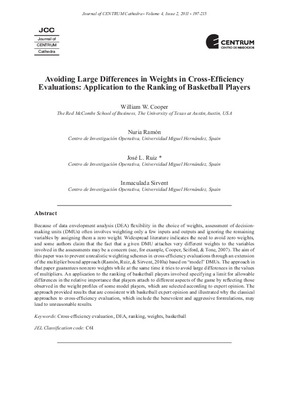| dc.contributor.author | Cooper, William W. | |
| dc.contributor.author | Ramón, Nuria | |
| dc.contributor.author | Ruiz, Jose L. | |
| dc.contributor.author | Sirvent, Inmaculada | |
| dc.date.accessioned | 2023-07-21T19:18:15Z | |
| dc.date.available | 2023-07-21T19:18:15Z | |
| dc.date.issued | 2011 | |
| dc.identifier.uri | https://repositorio.pucp.edu.pe/index/handle/123456789/194798 | |
| dc.description.abstract | Because of data envelopment analysis (DEA) flexibility in the choice of weights, assessment of decision-making units (DMUs) often involves weighting only a few inputs and outputs and ignoring the remaining variables by assigning them a zero weight. Widespread literature indicates the need to avoid zero weights, and some authors claim that the fact that a given DMU attaches very different weights to the variables involved in the assessments may be a concern (see, for example, Cooper, Seiford, & Tone, 2007). The aim of this paper was to prevent unrealistic weighting schemes in cross-efficiency evaluations through an extension of the multiplier bound approach (Ramón, Ruiz, & Sirvent, 2010a) based on “model” DMUs. The approach in that paper guarantees nonzero weights while at the same time it tries to avoid large differences in the values of multipliers. An application to the ranking of basketball players involved specifying a limit for allowable differences in the relative importance that players attach to different aspects of the game by reflecting those observed in the weight profiles of some model players, which are selected according to expert opinion. The approach provided results that are consistent with basketball expert opinion and illustrated why the classical approaches to cross-efficiency evaluation, which include the benevolent and aggressive formulations, may lead to unreasonable results. | en_US |
| dc.language.iso | eng | |
| dc.publisher | Pontificia Universidad Católica del Perú. CENTRUM | |
| dc.relation.ispartof | urn:issn:1851-6599 | |
| dc.rights | info:eu-repo/semantics/openAccess | es_ES |
| dc.rights.uri | http://creativecommons.org/licenses/by/4.0 | * |
| dc.source | Journal of CENTRUM Cathedra, Vol. 4, Issue 2 | |
| dc.subject | Cross-efficiency evaluation | en_US |
| dc.subject | DEA | en_US |
| dc.subject | Basketball | en_US |
| dc.subject | Ranking | en_US |
| dc.subject | weights | en_US |
| dc.title | Avoiding Large Differences in Weights in Cross-Efficiency Evaluations: Application to the Ranking of Basketball Players | en_US |
| dc.type | info:eu-repo/semantics/article | |
| dc.type.other | Artículo | |
| dc.subject.ocde | https://purl.org/pe-repo/ocde/ford#5.02.04 | |
| dc.publisher.country | PE | |


